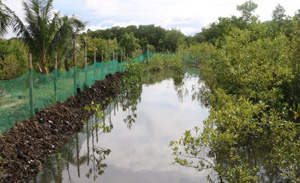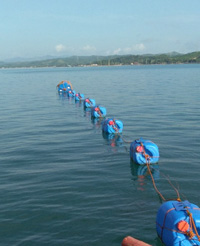DTI, DOST ink MOU to promote Filipino innovation
TAGUIG CITY, April 15 (PIA) -- Department of Trade and Industry (DTI) Secretary Ramon M. Lopez and Department of Science and Technology (DOST) Secretary Fortunato T. de la Peña signed a Memorandum of Understang (MOU) to promote Filipino innovation, or “Filipinovation,” for entrepreneurs.
“Innovation is when you fix something, even if it’s not broken. In entrepreneurship, continuous innovation in products, processes, business model, is the only way to survive,” Sec. Lopez said.
“Through the MOU, DTI and DOST will merge One Town One Product (OTOP) and Go Lokal entrepreneurs with DOST’s oneSTore.PH hubs. ‘OTOPrepreneurs’ may now also use DOST’s online store, oneSTore.PH, to sell their products”, Sec. de la Peña said.
Meanwhile, DOST will also provide selected Negosyo Centers with S&T Nooks for those who want to access DOST’s resources but don’t have internet connection.
MSMEs comprise 99.6% of enterprises and 70% of employment in the country, but only account for 35% - 40% of Gross Value Added contribution to the economy. Sec. Lopez said innovation can bridge this gap because when MSMEs transform raw materials into quality products, they can sell at premium prices and reach international markets.
“President Duterte wants to make the MSMEs smarter and bigger, not just in number, but also in terms of contribution to the economy. It’s easy to become an entrepreneur—but to have high quality, differentiated products is the real challenge, but it is their ticket to greater success and better quality life,” added Sec. Lopez.
DTI and DOST previously signed an MOU in 2017 to formulate and implement the Inclusive Filipinovation & Entrepreneurship Roadmap. To implement this, DTI has the following programs to help entrepreneurs, among others: Shared Service Facilities (SSF), a machine-lending service to cooperatives; Pondo para sa Pagbabago at Pag-asenso (P3), a low-interest collateral-free loan program to MSMEs; Kapatid Mentor Me and SME Roving Academy training programs; and, Go Lokal!, a project that discovers and improves MSME products and helps them reach mainstream markets.
DTI also developed the Inclusive, Innovation-led, Industrial strategy (i3s)—wherein the academe, industry, and government sectors collaborate to solve business innovation challenges.
DOST on the other hand, provides the following services to MSMEs: Small Enterprise Technology Upgrading Program (SET UP), that provides machines and technology training to individuals or companies; Science and Technology Expert Volunteers’ Program (STEVPP), where S&T experts provide free consultations and assistance to communities and cooperatives; Testing and Calibration services to ensure that products reach health and quality standards; and Packaging and Labeling assistance. (DTI/SDL/PIA-NCR)






